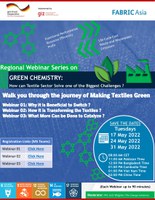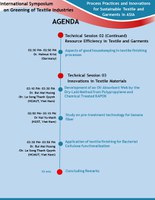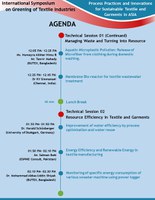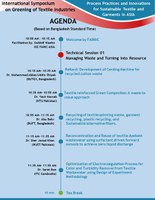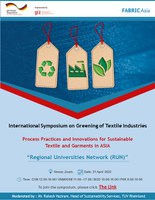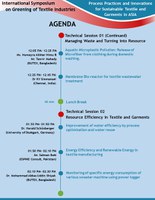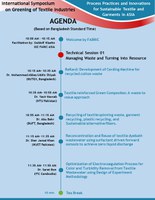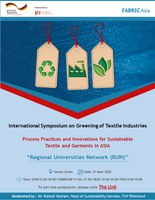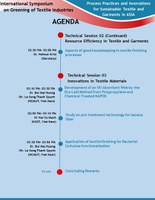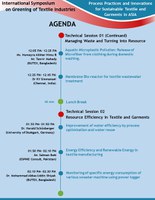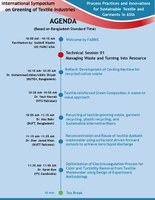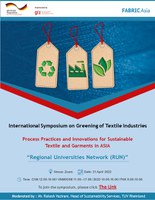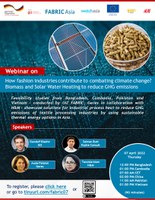Contributions Overview
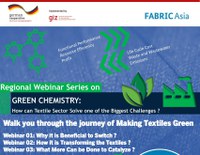
Webinar series on GREEN CHEMISTRY: How can Textile Sector Solve one of the Biggest Challenges?
Webinar series was organized by GIZ FABRIC on “GREEN CHEMISTRY” on 17 May, 24 May and 31 May 2022. The webinar series focused on innovative solutions through creating win-win situations by increasing profitability and reducing environmental footprint at the same time. It focused not only on the functionality of the green chemicals but also on the least resource input requirements. Thus, leading to undoubtedly reduced production cost. Webinar recordings are available below.
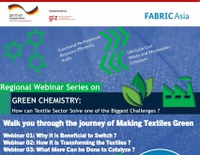
Webinar series on GREEN CHEMISTRY: How can Textile Sector Solve one of the Biggest Challenges?
Webinar series was organized by GIZ FABRIC on “GREEN CHEMISTRY” on 17 May, 24 May and 31 May 2022. The webinar series will focus on innovative solutions through creating win-win situations by increasing profitability and reducing environmental footprint at the same time. It will focus not only on the functionality of the green chemicals but also on the least resource input requirements. Thus, leading to undoubtedly reduced production cost. Webinar 01 The 1st webinar focused on why it is necessary to switch from the products of conventional chemistry to green chemistry in textiles. The principles and potential applications of green chemistry were shared. It was also discussed that what are the non-conformities caused by the use of conventional chemistry solutions in textile and garment industry. Later some of the ongoing initiatives for restricting the use of chemicals having high environmental burden were discussed. Webinar 02 In the 2nd webinar, the global leaders in chemical manufacturing and formulations introduced their commercialized products produced under the principles of green chemistry. These products use lesser energy & water, reduce GHG emissions and produce lesser wastewater creating a win-win situation. Later textile producer’s perspective was also presented briefing their challenges in adoption of these innovative green products. Initial higher cost and reproducibility of results were key consideration for the factories. Webinar 03 In the 3rd webinar chemical leasing was presented as a business model to promote use of environmentally friendly chemicals for textile. Afterwards all the questions encountered in the webinar series were presented to keynote speakers of first two webinars in a panel discussion. The panelists highlighted critical points for accelerated uptake of green chemistry by industry and agreed on increased need of collaboration especially in context of environmental footprint and GHG emissions from textiles.
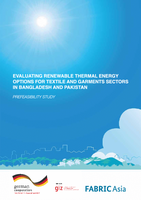
Most country energy production is primarily dependant on fossil fuel, which is also true for thermal energy generation or industrial process heat. Alternatively, renewable fuel - biomass fuel or solar based thermal energy generation is considered to reduce Green House Gas (GHG) emission by substituting the use of fossil fuel. GIZ FABRIC in collaboration with H&M has conducted a prefeasibility study on replacing fossil fuel based thermal energy generation with renewable fuel (biomass, solar etc.) in textile and garments sector in Bangladesh and Pakistan. The goal of the study was to identify potentials to reduce the GHG emissions with the focus on renewable energy resources. Under this study renewable fuel market of Bangladesh and Pakistan and alternative renewable sources for boilers or thermal application or process heat have been assessed and suitable renewable thermal energy options have been evaluated. To get a detail insight of this study, please check the report.

